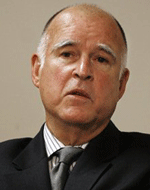 Senator Yee Reintroduces Executive Pay Limitation Legislation – For much of his first two years as governor, Jerry Brown has largely been silent on matters of UC compensation for top executives, including chancellors.However, perhaps feeling he owes students for pushing his tax measure over the top, the governor has taken an increasingly vigilant role on UC matters, first pressing the UC Board of Regents following the election not to raise student fees, and now criticizing a pay increase for the new UC Berkeley Chancellor.
Senator Yee Reintroduces Executive Pay Limitation Legislation – For much of his first two years as governor, Jerry Brown has largely been silent on matters of UC compensation for top executives, including chancellors.However, perhaps feeling he owes students for pushing his tax measure over the top, the governor has taken an increasingly vigilant role on UC matters, first pressing the UC Board of Regents following the election not to raise student fees, and now criticizing a pay increase for the new UC Berkeley Chancellor.
On Tuesday, he criticized the Board of Regents as they hired Nicholas Dirks to be the next chancellor of UC Berkeley with a $50,000 increase over his predecessor.
“The $50,000 increase above the incumbent, even though that incumbent has not received a pay raise, does not fit within the spirit of servant leadership that I think will be required over the next several years,” said Governor Brown.
According to the Bee, the governor “voted against Dirks’ compensation package, which includes an $8,916-a-year auto allowance, a $30,425 relocation bonus, a house on campus and an annual salary of $486,800, of which $50,000 will be paid by private donors”
“I’ve just come through a campaign where I’ve pledged the people that I will use their funds judiciously and with real stewardship, with prudence,” Governor Brown added.
The governor promised that he would continue to press UC “for greater efficiency, greater elegance, modesty. … We are going to have to restrain this system in many, many of its elements and this will come with great resistance.”
The hiring of Chancellor Dirks for $486,000, a 10 percent increase over outgoing Chancellor Robert Birgeneau, drew the ire of State Senator Leland Yee.
Senator Yee responded that he will reintroduce his legislation that would prohibit executive pay hikes (using state or foundation funds) at UC or the California State University system during bad budget years, or when student fees increase. His bill was vetoed in 2009 by then-Governor Arnold Schwarzenegger and last year the bill fell one vote short of passage in the Senate Education Committee.
Given the governor’s active role, it seems much more likely that such a measure will pass this time around – particularly given the passage of Proposition 30 with support from students.
“Once again, the UC Board of Regents failed to show any restraint whatsoever,” said Senator Yee. “Despite calls from the Governor, they continue to line the pockets of their top administrators. I hope that Chancellor Dirks shows the same leadership of incoming CSU Chancellor Timothy White by refusing this pay hike, and in fact reducing his salary by 10 percent.”
“UC and CSU are public institutions designed to serve California’s students and not to be a cash cow for wealthy executives,” said Senator Yee. “I am committed to passing legislation to stop these egregious compensation practices and restore the public trust.”
In a statement, Senator Yee’s office says that he plans to reintroduce the bill when the legislature reconvenes for the 2013-14 session on Monday, December 3.
A year ago, following massive protests and arrests, pepper spraying and violence on campuses across the state, the Board of Regents and President Mark Yudof pushed through an ill-timed decision to further raise selected administrative salaries.
That move also earned a strong rebuke by Senator Yee, who lamented, “The Regents and Trustees are completely out of touch.”
“It is no wonder that protests are happening throughout the UC system,” he said.
“It is disingenuous for the UC President and the Regents to claim that the last thing they want to do is raise tuition on students,” the Senator added. “Certainly executive compensation should be on the chopping block before a heavier burden is put on students. This latest action by the Regents is just appalling.”
Once again, this year, the Board of Regents was quick to defend their decision.
Regent George Kieffer claimed the salary increase was appropriate for the leader of the top public university in the world. He argued that UC has demonstrated a commitment to keeping salaries down, arguing that a survey showed that UC’s chancellors are paid in the bottom third of the group.
“We’ve already begun to attempt to draw down this disparity in incomes and this growth of compensation at the executive level,” Mr. Kieffer said.
Clearly, the governor disagrees.
—David M. Greenwald reporting

This is pay increase is wrong on so many levels.
Agreed. There is a time and place for a pay increase, but this is not it.
David wrote:
> Clearly, the governor disagrees.
If the governor makes an effort to roll back the pay increase (say veto everything with funds to UC until the $50K is given back) I’ll believe he “disagrees”, if not he is just “pretending to disagree” to try and make people feel better…